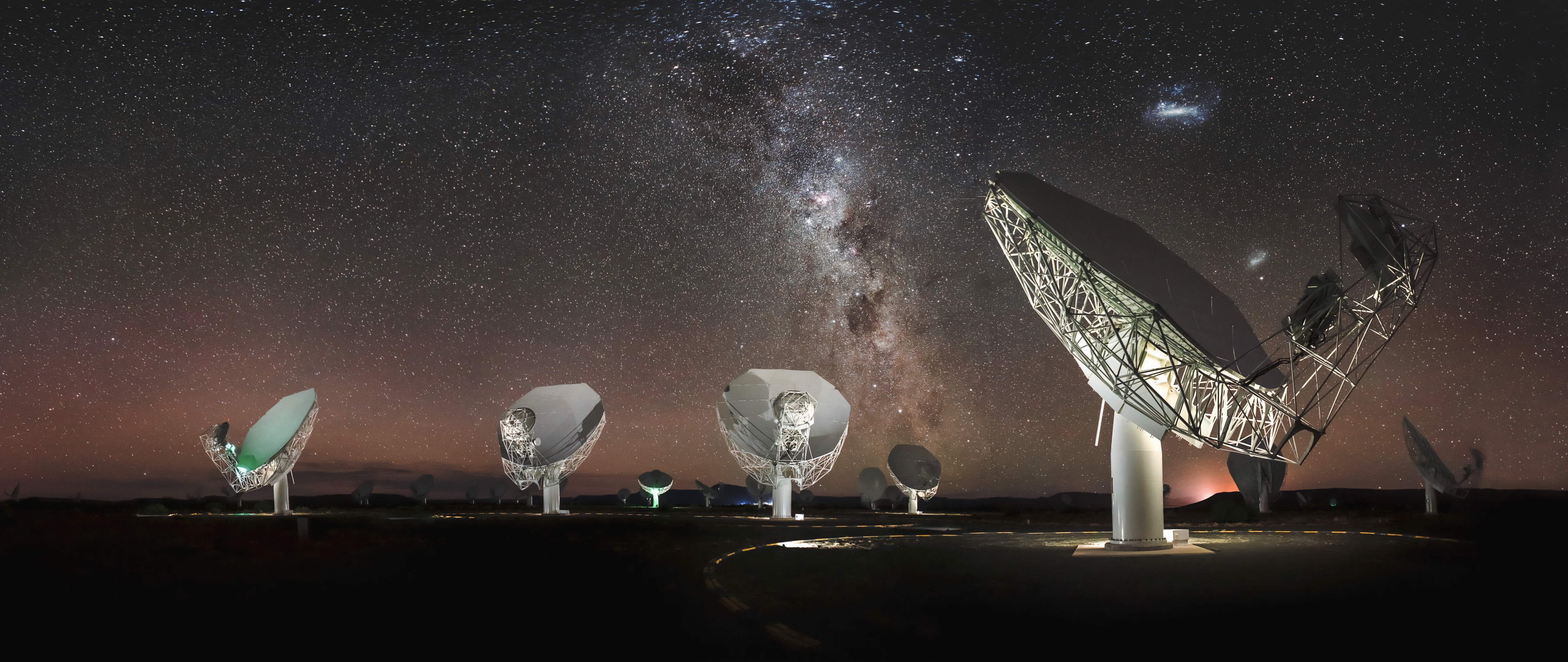
MeerKAT radio telescope. Credit: South African Radio Astronomy Observatory/'Sarel van Staden & Maryna Cotton
The WRC, organised by the International Telecommunication Union (ITU) every three to four years, gathers thousands of experts worldwide to revise the Radio Regulations—an international treaty that defines the rules for the use of the radio spectrum. The ongoing conference in Dubai will address and determine the agenda for the next session in 2027.
In response to increasing challenges to the radio sky, the radio astronomy community has submitted specific agenda items to add the topic of satellite constellation interference on radio astronomy to the agenda of the next WRC.
“Securing an agenda item at the WRC is not an easy task and this would be the first radio astronomy agenda item for more than a decade”, observes Busang Sethole, Spectrum Engineer at the SARAO. However, it is a crucial one, especially considering that more than 50 thousand satellites are planned to be deployed in low Earth orbit by 2030. “Radio astronomers are organised and united behind the need to act, owing to the rapid proliferation of large satellite constellations in the last couple of years”, as explained by Sethole.
Agenda items on behalf of the radio astronomy community were submitted by the European Conference of Postal and Telecommunications Administrations (CEPT) and by the African Telecommunication Union (ATU), with ATU’s agenda item focusing on the international protection of radio quiet zones. South Africa, home to the MeerKAT telescope, a precursor to what will be one of the major new telescopes of the SKA Observatory, leads ATU efforts to study and address satellite interference challenges. Additionally, in the Radiocommunication Assembly held before the WRC, radio astronomers from the Inter-American Telecommunication Commission (CITEL) had taken the initiative to propose a mechanism for registering radio quiet zones at the ITU Radiocommunication Sector (ITU-R). Their proposal was met with approval.
The agenda items submitted at the current WRC are closely connected with the significant endeavors of the IAU Centre for the Protection of the Dark and Quiet Sky from Satellite Constellation Interference (CPS). Key contributors to these efforts are its members, in particular the European Science Foundation’s Committee on Radio Astronomy Frequencies (CRAF), the South African Radio Astronomy Observatory (SARAO), and the SKA Observatory (SKAO), which co-hosts CPS. They have long been advocating for enhanced protection of radio astronomy against the adverse effects of satellite constellations. “Preserving the sky for future generations is one of the most important goals of the Opticon-RadioNet Pilot (ORP). We have therefore actively contributed to these initiatives”, Michael Kramer, director of the Max-Planck-Institute for Radio Astronomy and Chair of the ORP sky protection group said.
Federico Di Vruno, co-director of the CPS and lead spectrum manager at the SKAO, emphasises: “Satellite constellations can bring benefits for global connectivity, Earth observations, and navigation systems. However, they produce significant changes in the radio frequency environment, in our quiet skies. The CPS fully supports the initiatives to protect the radio sky at the ITU”. The CPS is coordinating the global astronomy community’s efforts to study the impact of these satellites and to seek mitigation measures with administrations and industry.
“For decades, the Radio Regulations have protected radio astronomy by reserving specific frequency ranges for its use”, notes Waleed Madkour, CRAF’s frequency manager. However, “the rules have not kept pace with recent changes in low Earth orbit, with the launch of thousands of new satellites that are quickly filling the sky”.
In light of these developments, the African and European proposals at the ongoing WRC are part of a coordinated effort by the radio astronomy community to address the issue at the highest international level. Astronomers, along with numerous supporting countries, are actively seeking broader support to ensure the inclusion of these proposals in the agenda for the next WRC.
Read more in the initial text by CPS: https://cps.iau.org/news/cps-advocates-for-international-radio-astronomy-protection-from-satellite-interference/